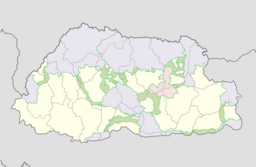Thrumshingla National Park
| Phrumsengla National Park (ཕྲུམ་སེང་རྒྱལ་ཡོང་གླིང་ག) | |
| (formerly: Thrumshingla National Park) | |
| Protected Area | |
| Official name: Phrumsengla | |
| Country | Bhutan |
|---|---|
| District | Bumthang, Lhuntse, Mongar, Zhemgang |
| Landmark | Thrumshing La Pass |
| Highest point | |
| - elevation | 4,400 m (14,436 ft) |
| Lowest point | |
| - elevation | 700 m (2,297 ft) |
| Area | 905.05 km2 (349 sq mi) |
| Animal | threatened hornbills |
| Founded | 1998 |
| Website: Bhutan Trust Fund for Environmental Conservation | |
Coordinates: 27°16′59″N 90°58′40″E / 27.28306°N 90.97778°E
Phrumsengla National Park (ཕྲུམ་སེང་རྒྱལ་ཡོང་གླིང་ག) [formerly Thrumshingla National Park] in central Bhutan covers just over 905 square kilometres (349 sq mi) across four districts, but primarily in Mongar. It is bisected by the Lateral Road, and contains the Thrumshing La pass.
Phrumsengla is a temperate park with large tracts of old-growth fir forests, its altitudes ranging from 700 metres (2,300 ft) to 4,400 metres (14,400 ft). Phrumsengla is home to six species of threatened birds: the rufous-necked hornbill (Aceros nipalensis), rufous-throated wren-babbler (Spelaeornis caudatus), satyr tragopan (Tragopan satyra), beautiful nuthatch (Sitta formosa), Ward's trogon (Harpactes wardi) and Chestnut-breasted partridge (Arborophila mandellii), as well as the near-threatened wedge billed wren babbler (Sphenocichla humei). Phrumsengla has scenic views, including forests ranging with elevations from alpine to sub-tropical. Because the soil of Phrumsengla's biomes is particularly fragile, the land is unsuitable for logging or other development.
...
Wikipedia

